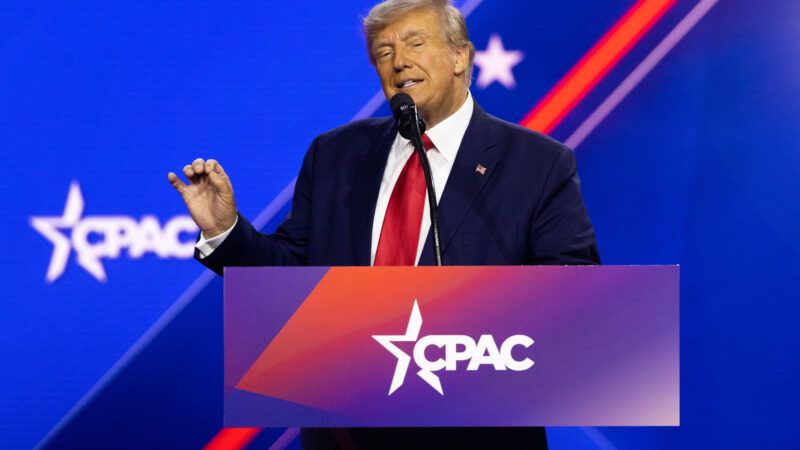The Decent Idea Buried in Trump's Goofy 'Freedom Cities' Plan
The federal government owns the majority of land in states that have seen the biggest pandemic-era housing price spikes. Selling that land off for residential development makes abundant sense.

It might sound silly, but there's half a good idea tucked away in Donald Trump's proposal to create new "freedom cities" on federal lands.
"Past generations of Americans pursued big dreams and daring projects that once seemed impossible. They pushed across an unsettled continent and built new cities in the wild frontier," Trump said in a Friday campaign video.
The former president and current presidential candidate wants to bring this pioneering magic back by holding design contests for 10 new cities to be constructed on a small portion of the federal government's vast landholdings. The feds would vet submitted designs and then grant charters to the winners.
"These freedom cities will reopen the frontier, reignite the American imagination, and give hundreds of thousands of young people and other people, all hardworking families, a shot at home ownership and the American dream," declared Trump. He also announced his intentions to jumpstart a flying car industry, revive American manufacturing, and bring beauty and safety back to America's existing cities.
It's basically the grandiose MAGA version of the liberal "abundance agenda," which calls for America to build-baby-build until we have enough comfortably affordable housing to shelter one billion Americans.
Some of the proposals Trump outlined in his video are more ridiculous than others. As described, his vision of federally vetted and charted "freedom cities" certainly isn't a particularly libertarian—or practical—idea.
Like other products of the marketplace, cities tend to emerge naturally where they make sense. They require some matchmaking between geographic advantage, available resources, pre-existing industry or infrastructure, and more to really get going.
America already has a lot of cities and towns with jobs and housing. Anyone trying to build a new city from scratch needs to ask themselves why people would move there and what would they do once they arrive.
Trying to bootstrap a whole new city from scratch would almost certainly require a mess of incentives, subsidies, and industrial policy that would be anathema to anything deserving the name "freedom city." One need only look at Saudi Arabia's "The Line" project to see how badly off-track new cities can get when their government sponsors treat them like a Lego set.
All that said, Trump is correct when he notes that the federal government owns nearly a third of U.S. lands (28 percent to be precise) and that much of it is ripe for new development. Making that happen wouldn't require the feds to sign off on exquisitely designed charter cities. They'd just have to get out of the way.
The slightly less utopian but much more practical version of Trump's "freedom cities" is a 2022 bill from Sen. Mike Lee (R–Utah), the Helping Open Underutilized Space to Ensure Shelter (HOUSES) Act. (I know.)
Lee's proposal would allow state and local governments to purchase federally owned lands at below-market rates for the purposes of building new residential communities. Jurisdictions buying the federal lands would have to agree to a minimum density of one home per quarter acre. They also wouldn't be allowed to purchase land located in national parks, monuments, wilderness preserves, or other protected areas. The U.S. Department of Interior would be approve the sales, with the revenue going to the maintenance of national parks, forest fire prevention, and public water infrastructure.
An August 2022 report on Lee's bill, published by Congress's Joint Economic Committee (JEC) Republicans, notes that the federal government owns a huge amount of land in Western states where home prices spiked during the pandemic.
Home prices increased 30 percent in Nevada and nearly 50 percent in Idaho from 2019 to 2021, according to the report. The federal government owns 80 percent of Nevada and 60 percent of Idaho. Much of that land is within the metro areas of Las Vegas and Boise.
The JEC report includes pictures of Las Vegas showing undeveloped federal lands surrounded by suburban subdivisions. Private developers would eagerly convert that land into new neighborhoods if they were allowed. The report's authors estimate that the HOUSES Act could lead to as many as 2.7 million new homes, growing the housing stock by as much as 15 percent in some western states.
The HOUSES Act sputtered out in the Senate last year. The Bureau of Land Management came out strongly against it. Lee has yet to reintroduce it this Congress.
If it did pass, it probably wouldn't produce the "freedom cities" Trump floated. But it could add a little bit of sweet freedom to existing cities in desperate need of new housing.
Rent Free is a weekly newsletter from Christian Britschgi on urbanism and the fight for less regulation, more housing, more property rights, and more freedom in America's cities.


Show Comments (114)